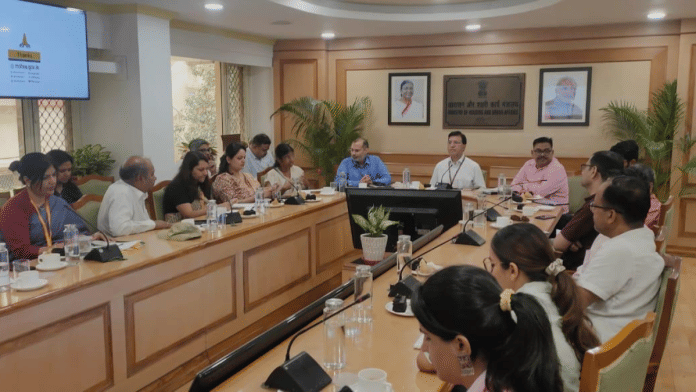New Delhi: With the Smart Cities Mission (SCM) ending on 31 March, uncertainty looms large over the future of Special Purpose Vehicles (SPVs) or private companies set up in 100 cities to implement projects and manage infrastructure created under the mission, ThePrint has learnt.
Launched in June 2015, 100 cities started the mission through SPVs—joint ventures between municipal corporations and state governments. Registered as private companies under the Companies Act of 2013, SPVs received mission funding for operations, staff salaries, and project implementation from the Centre and state governments.
SPVs, with their dedicated team of data, technology, and engineering experts, have played a crucial role in successfully implementing projects under the Smart Cities Mission. As the mission nears its end, cities are exploring options, such as downsizing the staff, to sustain the SPVs.
In Uttar Pradesh, which has 10 smart cities—Lucknow, Agra, and Kanpur, among others—the state government is already downsizing the staff hired by SPVs.
A senior official with the UP government urban development department told ThePrint, “The plan is to keep minimum staff in SPVs, as needed under the Company Act. We have asked cities to downsize the staff strength. As for providing funds for daily operations of the SPVs, we have requested the finance department to provide funds until a decision on whether to continue them is taken.”
While some state governments are taking measures to ensure minimum staff in the SPVs, others are waiting for the Ministry of Housing and Urban Affairs (MoHUA) to issue guidelines on whether to continue the SPVs beyond 31 March.
In some cities, experts hired by the SPVs to implement projects, including the Integrated Command and Control Centre (ICCC), have begun to resign due to uncertainty over the SPV future.
“We hired several domain experts to implement crucial projects such as the ICCCs. But now a lot of people have started resigning due to lack of clarity about the future of the mission,” said a senior official with the Pune Smart Cities Development Corporation.
Maharashtra has eight smart cities—Pune, Solapur, Nagpur, Thane, Nashik, Aurangabad (now Chhatrapati Sambhajinagar), Pimpri Chinchwad and Kalyan-Dombivali. Pune Smart Cities Development Corporation and others have written to the state government, demanding clarity on what will happen after 31 March.
A senior official with the Maharashtra government urban development department told ThePrint, “We are awaiting the Centre’s advisory on the continuation of SPVs beyond the mission period. A decision—if to discontinue the SPVs or not—will be based on that advisory.”
Some officials in states such as Karnataka and Maharashtra, among others, said that SPVs have funds to pay salaries for a few months. After that, the daily expenditure can be met with financial assistance.
To maintain assets in smart cities, the Parliamentary Standing Committee on Housing and Urban Affairs has recommended that the MoHUA frame guidelines for the SPVs to continue, even after the mission is over.
In its report on the MoHUA’s Demand for Grants for 2025-26, which was tabled in Parliament last week, the committee said, “The Smart Cities are intended to act as ‘lighthouse’ for other aspiring cities.” With that, it recommended the ministry take charge of the guidelines to ensure proper preservation and maintenance of assets created under the mission.
ThePrint has reached the MoHUA via WhatsApp and phone calls for its comments. This story will be updated as soon as the MoHUA responds.
Also read: Rs 20,875 cr from FY25 budget unspent, House panel flags slow pace of urban development projects
Projects complete, states plan for O&M
Over the past decade, roughly 8,000 projects worth Rs 1.64 lakh crore have been sanctioned under the Smart Cities Mission. Of this, 7,479 projects worth Rs 1.5 lakh crore had been completed by January 2025.
State government officials say that efforts are underway to plan for the operation and maintenance of the assets created under the mission.
Most cities have handed over all drains, sewage treatment plants, and road infrastructure developed under the mission to municipal corporations and other state organisations for maintenance. The ICCC operations continue in nearly all cities under the SPVs.
One of the mission’s key achievements, the ICCCs are helping cities make real-time data-driven decisions. A team of domain experts operate the ICCCs. A senior SPV official in Bhopal, Madhya Pradesh, said that domain experts are needed to run ICCCs, which require regular upgradation of technology.
A senior official with the Madhya Pradesh government said, “Domain experts will be needed to run ICCCs. Currently, the SPV has funds to pay for the salaries of experts hired for various projects. But additional funds will be needed for a few years till the SPVs become financially viable.”
In some states such as Karnataka, Uttar Pradesh, Madhya Pradesh, etc., SPVs are exploring the possibility of generating revenue from traffic challans.
“CCTVs installed under the mission and the ICCCs are being used to issue traffic challans. We are requesting our state government to share the revenue generated from challans with the SPVs. We are also exploring other options to generate revenue to sustain the SPV created under Smart Cities Mission,” said Veereshkumar, managing director and chief executive officer, Davanagere Smart City Limited.
(Edited by Madhurita Goswami)







I have not seen any city become ‘smart’ with this scheme. This is an utter flop scheme.